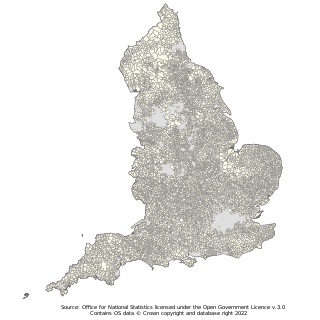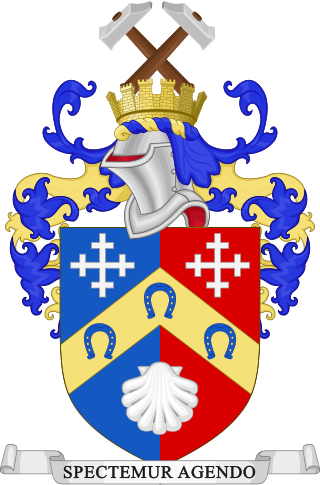
A parish council is a civil local authority found in England, which is the lowest tier of local government. Parish councils are elected corporate bodies, with variable tax raising powers, and they carry out beneficial public activities in geographical areas known as civil parishes. There are about 10,480 parish and town councils in England. Parish councils may be known by different styles, they may resolve to call themselves a town council, village council, community council, neighbourhood council, or if the parish has city status, it may call itself a city council. However their powers and duties are the same whatever name they carry.

In England, a civil parish is a type of administrative parish used for local government. It is a territorial designation which is the lowest tier of local government. Civil parishes can trace their origin to the ancient system of parishes, which for centuries were the principal unit of secular and religious administration in most of England and Wales. Civil and religious parishes were formally split into two types in the 19th century and are now entirely separate. Civil parishes in their modern form came into being through the Local Government Act 1894, which established elected parish councils to take on the secular functions of the parish vestry.

The Wales and Berwick Act 1746 was an Act of the Parliament of Great Britain that created a statutory definition of England as including England, Wales and Berwick-upon-Tweed.

The Anatomy Act 1832 is an Act of Parliament of the United Kingdom that gave free licence to doctors, teachers of anatomy and bona fide medical students to dissect donated bodies. It was enacted in response to public revulsion at the illegal trade in corpses.
A vestry was a committee for the local secular and ecclesiastical government of a parish in England, Wales and some English colonies, which originally met in the vestry or sacristy of the parish church, and consequently became known colloquially as the "vestry". At their height, the vestries were the only form of local government in many places and spent nearly one-fifth of the budget of the British government. They were stripped of their secular functions in 1894 and were abolished in 1921.

The Highway Act 1835 is an Act of the Parliament of the United Kingdom. It was one of the Highway Acts 1835 to 1885.

The London Government Act 1899 was an act of the Parliament of the United Kingdom that reformed the administration of the capital. The act divided the County of London into 28 metropolitan boroughs, replacing the 42 local authorities administering the area. The legislation also transferred a few powers from the London County Council to the boroughs, and removed a number of boundary anomalies. The first elections to the new boroughs were held on 1 November 1900.

The Metropolis Management Act 1855 was an Act of the Parliament of the United Kingdom that created the Metropolitan Board of Works, a London-wide body to co-ordinate the construction of the city's infrastructure. The Act also created a second tier of local government consisting of parish vestries and district boards of works. The Metropolitan Board of Works was the forerunner of the London County Council.

The Local Government Act 1933 was an act of the Parliament of the United Kingdom that consolidated and revised existing legislation that regulated local government in England and Wales. It remained the principal legislation regulating local government until the Local Government Act 1972 took effect in 1974.

The Union of Benefices Act 1860 was legislation which prevented the need for other acts if following its prescribed three-stage scheme. It enabled reduction of the number of parish churches and vicars/rectors in London's "Metropolis", as defined by a narrower Act five years before. It instead allowed commissions to recommend dissolution to various parties, which would then be a formality agreed by Order-in-Council.

Westminster St James was a civil parish in the metropolitan area of London, England. The creation of the parish followed the building of the Church of St James, Piccadilly, in 1684. After several failed attempts, the parish was formed in 1685 from part of the ancient parish of St Martin in the Fields in the Liberty of Westminster and county of Middlesex. It included part of the West End of London, taking in sections of Soho, Mayfair and St James's. Civil parish administration was in the hands of a select vestry until the parish adopted the Vestries Act 1831. The vestry was reformed again in 1855 by the Metropolis Management Act. In 1889 the parish became part of the County of London and the vestry was abolished in 1900, replaced by Westminster City Council. The parish continued to have nominal existence until 1922.

The Short Titles Act 1896 is an act of the Parliament of the United Kingdom. It replaces the Short Titles Act 1892.

The Poor Law (Scotland) Act 1845 was an Act of Parliament that reformed the Poor Law system of Scotland.

The Interpretation Act 1889 was an act of the Parliament of the United Kingdom.

The Marriage Act 1836, also known as the Act for Marriages in England 1836 or the Broomstick Marriage Act, was an act of the Parliament of the United Kingdom that legalised civil marriage in what is now England and Wales from 30 June 1837.

The Burial Laws Amendment Act 1880 is an Act of the Parliament of the United Kingdom. It is one of the Burial Acts 1852 to 1885.

The Seditious Meetings Act 1817 was an act of the Parliament of the United Kingdom of Great Britain and Ireland that made it illegal to hold a meeting of more than 50 people.

The Vestries Act 1831, commonly known as Hobhouse's Vestry Act, was an Act of Parliament in 1831 and was a local government overhaul which also affected the Established Church at a local level. The act gave subsidiarity in that local ratepayers would have to agree by a special majority for the reform to take effect in their local area (parish).

The Hammersmith Vestry was the vestry of Hammersmith from c.1631 to 1900. The vestry was established following the building of a chapel of ease for the inhabitants of Hammersmith in the parish of Fulham. Hammersmith became a distinct parish in 1834 and the vestry was also known as the Vestry of the Parish of Hammersmith.

The Metropolis Management Amendment Act 1885 was a public general act of the Parliament of the United Kingdom of Great Britain and Ireland that amended the Metropolis Management Act 1855 and other Metropolis Management Acts.








